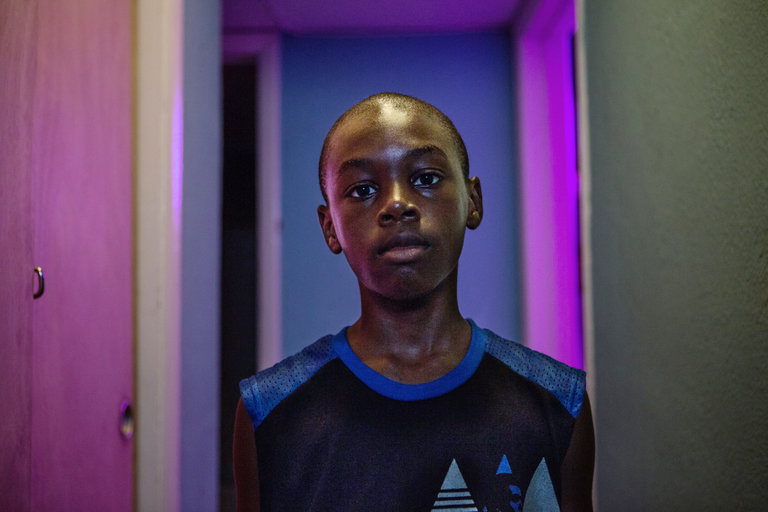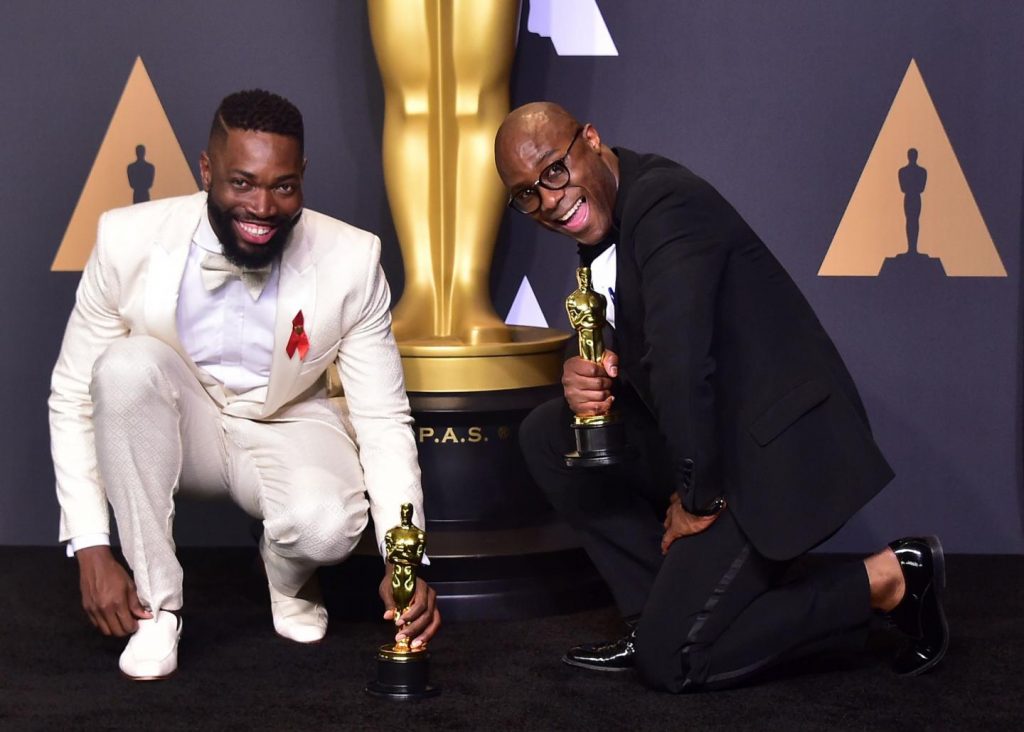Man-Child Under the Moonlight: Black Masculinity in the Promised Land

Sunday night’s mishap at the Oscars, which mistakenly gave the award for Best Picture to La La Land, reflects the unpredictable nature of award shows and the unexpected impact of film on reframing our understandings of the world. Made with a small budget of one million dollars and highlighting same-sex love in black communities, Moonlight is a sleeper surprise. Based on Tarell Alvin McCraney‘s award-winning play In Moonlight Black Boys Look Blue, the film Moonlight, directed by Barry Jenkins, defies our expectations about filmmaking, masculinity, Blackness, and the power of love to conquer time and space.
Moonlight is an extremely powerful exploration of black manhood. It is cinematography at its best and nothing short of a visceral masterpiece. Set in the gritty concrete jungle of Liberty City, one of two black communities in Miami, the film is a coming-of-age story. It is framed around the interrelated and conjoined stories of a drug-addicted mother and a drug dealer and his common-law wife, both of whom facilitate the maturation of the film’s central character, Chiron. An extremely young man who struggles with his nascent homosexuality, Chiron is a man-child in the moonlight. As a man-child in the moonlight, he negotiates the complex terrain related to maintaining an outward facade of masculinity clothed in toughness and the inner turbulence of his nascent homosexuality. This negotiation creates a resolvable tension in the film which is worked out under the magical luminescence of the moonlight.

Moonlight is told in three chapters: “Little,” “Chiron,” and “Black.” The viewer is treated to a complex portrait of masculinity and homosexuality in black communities that is seldom explored in the mainstream media. Moving beyond the clichés of a monolithic, rabidly anti-gay black community and the erroneous association of black masculinity with muscularity and thuggism, the film gazes deep into the lived experiences of its characters. Forced to hide in an abandoned trap house (drug den) from his classmates who are taunting him, Little, as Chiron is framed in the first part, is discovered by Juan, the neighborhood dope pusher, who assumes the role of surrogate father. Played brilliantly by Mahershala Ali, he not only binds up the boy’s festering emotional wounds but works ardently to promote complex notions of black identity. This is not surprising given the central role played by black Bahamians in building the city of Miami, coupled with the subsequent immigration of black Haitians and Cubans. Along with his common-law wife, played by Janelle Monáe, he works to provide stability and acceptance of Little’s lifestyle and support his maturation as a young adult.
Kevin, Chiron’s only friend at school, aids him in this process and admonishes him to be tough. The two boys wrestle in an attempt to demonstrate an absence of “softness.” They emerge from the duel satisfied they are tough enough to confront the world. One of the film’s most poignant moments is Juan’s declaration of his Afro-Cuban ancestry and the fact that black people exist everywhere in the world. He also admonishes Little to define himself. The facade of hyper-masculine heterosexuality is shattered as Juan unpacks the meaning of the word “faggot” coupled with an admission that he is a drug seller and thus indirectly contributing to the instability of Little’s mother.

In the second chapter, Chiron emerges into the turbulence of adolescence. Comforted by an older Kevin, whose bravado masks deep insecurities and a need for acceptance, the two teenagers exchange small talk. They meet on a deserted beach and engage in a sexual encounter under the moonlight. Bonded more deeply by the experience, the two young men emerge into the moonlight more aware of their nascent sexuality but wholly unprepared for the unpredictability of adolescent life.
Goaded into a physical confrontation with Chiron by a cowardly, homophobic bully in school based on a game called Knockdown, Kevin repeatedly strikes Chiron. Perhaps recalling their childhood wrestling match, Chiron’s resilience is on display as he refuses to stay down. Tired of the constant abuse and teasing, Chiron takes matters into his own hands. He returns to school and confronts the bully by breaking a chair over his head. As Chiron is arrested and escorted out of the school, he exchanges a long, furtive glance with Kevin. The camera fades to black.

In the third chapter, we are exposed to Black. Chiron, now a grown man, emerges as an exact replica of Juan, the dope dealer who befriended him as a boy. Muscular and toned from years of bodybuilding in prison and elsewhere, he runs the local drug trade in Atlanta. Having rebuilt himself “from the ground up,” his muscular physique masks his inner pain. In a moving scene with his mother, who is now in a drug rehab facility, they confront the choices that have derailed their lives. Chiron’s mother admonishes him to change and their tearful exchange evokes a heart-tugging moment between mother and son.
This exchange becomes the catalyst for Black to reach out to his former lover Kevin. He travels back to Miami to find Kevin working in a diner as a chef. Kevin prepares the diner’s special and the two enjoy a meal and reminisce about old times. The scenes are poignant as the men attempt to make up for lost time. After exchanging small talk in the diner, Black drives Kevin back to his apartment. As Kevin leaves the car, Black finds himself at the same beach where they lost their innocence as adolescents. Once inside Kevin’s small, cramped apartment, the two men continue to talk. Kevin admits his immaturity as a young man. Now, after having been married and divorced, he seems at peace with himself. Having found his passion as a chef after a stint in prison, Kevin is finally comfortable in his own skin. Black, largely sullen and detached, is swept up in the confessional moment. In an unexpected twist that explodes every stereotype about masculinity and Blackness, he admits that he has never had a sexual partner since their encounter as teenagers. Unburdened by the revelation, the two embrace—a powerful moment of connection between two individuals whose lives are intertwined under the moonlight.
Copyright © AAIHS. May not be reprinted without permission.